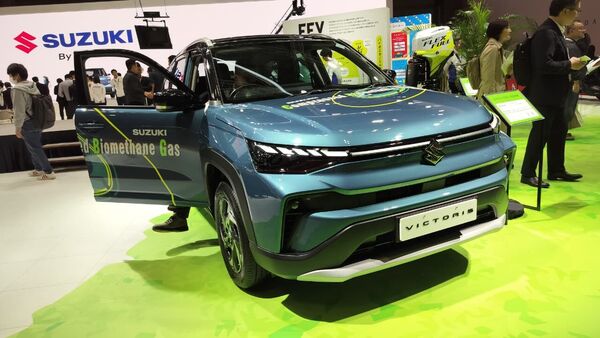At the heart of this vision lies compressed biogas (CBG), energy produced from cattle dung and farm waste. It is an unconventional approach, one that links Suzuki’s carbon-neutral ambitions to the rhythm of India’s rural economy.

View Personalised Offers on
When Toshihiro Suzuki, President, Suzuki Motor Corporation, speaks about achieving carbon neutrality, electric cars are rarely the first thing he mentions. His idea of clean mobility is broader, and far more grounded in India’s rural realities. For him, the future of sustainable transportation doesn’t begin in cities lined with charging stations but in the country’s dairies.


At the heart of this vision lies compressed biogas (CBG), energy produced from cattle dung and farm waste. It is an unconventional approach, one that links Suzuki’s carbon-neutral ambitions to the rhythm of India’s rural economy.
Also Read : Maruti Suzuki CNG models contribute over one third of total sales. Check details
A multi-pathway vision
Suzuki Motor Corporation has made no secret of its intent, India will be central to its global roadmap towards carbon neutrality by 2050. Yet, unlike many global automakers betting entirely on battery-electric vehicles, Suzuki has chosen a more balanced path.
Its multi-pathway strategy recognises India’s diversity, of incomes, infrastructure, and fuel availability. Electrification will certainly be part of the story, but so will hybrids, CNG, ethanol, and biogas. Through its Suzuki R&D Center India (SRDI), the company is developing parallel technologies suited to local needs rather than importing a one-size-fits-all solution.
At the Japan Mobility Show, Toshihiro Suzuki summed it up neatly: each market, he said, must find “its own way to carbon neutrality.” For India, that road will likely be built on local resources and community ecosystems, not imported batteries alone.
The dairy connection
This philosophy takes tangible form through Suzuki’s collaboration with India’s dairy cooperatives. In partnership with the National Dairy Development Board (NDDB) and Banas Dairy, the company plans to set up nine biogas plants across India by FY2026–27.
Four of these are already coming up in Gujarat’s Banaskantha district, one of India’s largest milk-producing regions. The initiative is being executed through NDDB Mrida Ltd, which focuses on sustainable dairy waste management.
Also Read : Maruti Suzuki India eyes 4 lakh exports in FY26 to counter domestic market slowdown
Each biogas plant will convert cattle dung and organic residue into compressed biogas. The gas will power vehicles, including Maruti Suzuki’s CNG models, or be used for local electricity generation. The residual slurry will return to the soil as organic fertiliser. It is, in many ways, a quiet revolution, waste turning into energy, energy into livelihood, and livelihood back into the land.
Rural energy, local value
Suzuki’s CBG programme stands out because it goes beyond emission targets to create local economic value. A waste product previously deemed valueless becomes a new source of income for farmers. The state profits from lower methane emissions and fewer oil imports, while Suzuki enhances its green credentials in an Indian vernacular.
Essentially, the firm is facilitating the turnaround of dairy cooperatives into micro energy centers, where each litre of milk and each kilogramme of dung is feeding into a cleaner, autarkic cycle. It’s an approach that slots into India’s larger agenda of Atmanirbhar Bharat, energy autarky built from scratch.
Complementing the EV push
Even while Suzuki embarks on its electric car plans, such as the new EV factory at Kharkhoda, Haryana, it remains pragmatic about India’s decarbonisation path. Bio-CNG and hybrid technologies will continue to have a parallel vital role.
This makes Suzuki’s approach parallel to what India’s policy framework is, which sees ethanol blending, biogas, and hybrids as pragmatic transition pathways. In rural and semi-urban India, where charging infrastructure is still limited, CBG provides an immediate, scalable, and local alternative.
Scaling up biogas, though, will not be without challenges. If successful, the project can serve as a model for rural clean mobility, and one that integrates climate ambition with the generation of livelihoods. For Suzuki, it is a low-key but profound transformation: from simply a car maker to a mobility ecosystem enabler, one poised at the nexus of agriculture, sustainability, and transport.
Get insights into Upcoming Cars In India, Electric Vehicles, Upcoming Bikes in India and cutting-edge technology transforming the automotive landscape.
First Published Date: 30 Oct 2025, 11:38 am IST







